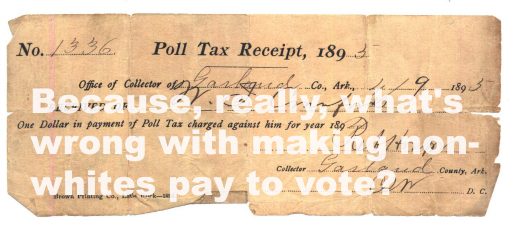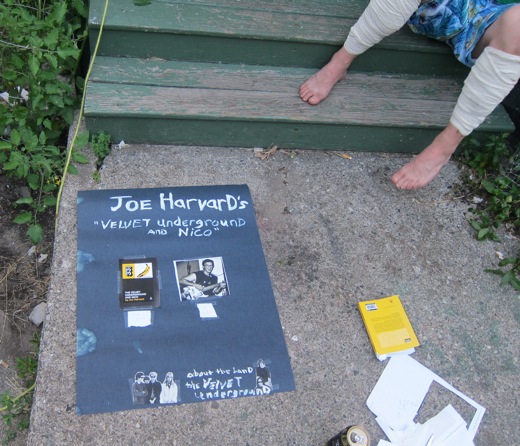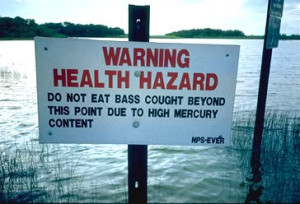In a 5-4 decision earlier today, the U.S. Supreme Court struck down Section 4 of the Voting Rights Act of 1965, stating that the provision, which, for almost 50 years, has required that certain areas of the country with dismal civil rights records obtain approval from the Justice Department or a special federal court before changing their voting laws, was unconstitutional. As Justice Scalia, one of the five conservative justices to vote in favor of striking down this particular component of the landmark civil rights legislation, has described the Voting Rights Act in the past as, “the perpetuation of a racial entitlement,” this really shouldn’t have come as a surprise to anyone. And yet it was a huge shock to many, like longtime Georgia congressman John Lewis, an African American who had fought for equal rights alongside Martin Luther King. After watching the high court read its ruling, the Congressman likened the decision to “a dagger in the heart of the Voting Rights Act.”
Richard Cohen, the president of the Southern Poverty Law Center, put the day’s events in context by stating the following:
From my office at the Southern Poverty Law Center, I can see the route where thousands marched from Selma to Montgomery in 1965 in support of the right to vote. Today, the Supreme Court basically said that the country should reverse its course.
In its decision to gut key provisions of the Voting Rights Act, the court brushed aside the considered judgment of a nearly unanimous Congress and opened the door to new forms of discrimination against minority voters.
After compiling an extensive legislative record, the House passed a bill in 2007 reauthorizing the preclearance provisions of the Voting Right Act by a vote of 390 to 33. In the Senate, the vote was even more lopsided – 98 to 0. Today, by a narrow 5-to-4 vote, the Supreme Court has said that Congress has to start over.
Chief Justice Roberts, writing for the activist wing of the court, said that the formula in the Voting Rights Act used to identify jurisdictions like Alabama and Mississippi for added voter protections was no longer “justified by current needs.”
The facts tell a different story.
In the history of voting in Alabama, not a single black candidate has been able to defeat a white incumbent or win an open seat in a statewide race. Black office holders in Alabama are confined almost exclusively to minority districts because voting in the state is still highly polarized along racial lines. This polarization distorts the political process and gives the majority the very ability to dominate the minority that the Voting Rights Act was designed to address.
And yes, places like Alabama in the Deep South are different. Again, the facts tell the story. While 40 percent of the white voting public cast their ballots for a black president nationwide, only 15 percent of white voters did so in Alabama. And as Justice Ginsburg pointed out in her dissent, there are still Alabama legislators who talk openly about suppressing the black vote and refer to black voters as “aborigines.” Freed by the Supreme Court from the protections for minority voters that Congress envisioned, one can only imagine what these kinds of legislators will think of next.
At the conclusion of the great Selma-to-Montgomery voting rights march, Dr. King said that it would not be long before the era of discrimination in voting would be behind us. After today’s decision, the path will be much longer and tortuous. But we must not be discouraged or give up. The dream is still worth fighting for.
So, now what? With this central protection of the Voting Rights Act gone, shouldn’t we expect to see a rise, especially in the south, of racially discriminatory voting practices?
The following, from Bill Moyers, is just one example of what we might expect to see in the near future, now that Section 4 has been stricken, assuming, of course that Congress does not step in to replace the legislation with new safeguards protecting voters in these souther states.
NORTH CAROLINA: Republicans, who control both state legislative chambers and the governor’s office, have proposed and/or passed bills that would require a narrow set of photo identification cards to vote, that would cut early voting, potentially penalize the parents of college students who vote away from their parents’ home, and would implement probably the strictest felony disenfranchisement law in the nation. None of these are law, but they would have had to pass federal preclearance review under Section 5. Almost 500,000 North Carolinians lack the ID needed to vote under the proposed law, a third of them African Americans. Hundreds of North Carolina citizens have been arrested over the past couple months while protesting these laws.
And that, my friends, is why we’re going to have to fight the battles of the civil rights era all over again…
And, for what it’s worth, fuck anyone who believes that voting is a “racial entitlement,” regardless of whether or not they happen to be members of the Supreme Court.
[Also, I should point out that I know that everyone paid poll taxes in areas where they existed, and not just non-whites, as I’ve stated in the graphic above. Still, though, I think it’s pretty clear that the intention of said taxes was to raise the barrier to a point where voting was out of reach of poor southern blacks. Now, of course, we have other ways of doing that.]
















